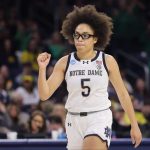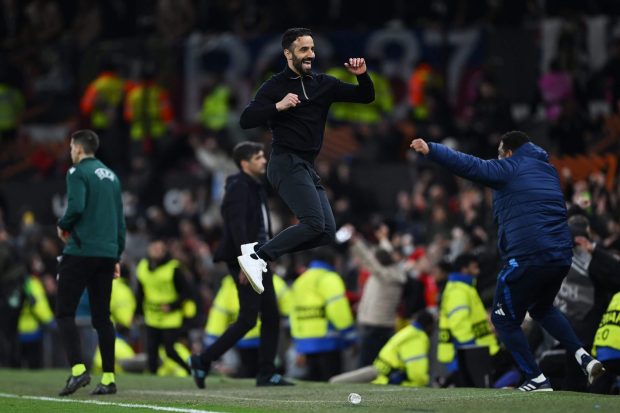
With just a few weeks left before awards ballots go out, we already know how one of the races will go. Connor Hellebuyck will win the Vezina Trophy. And if there’s any justice, the GMs who vote on the award will make it unanimous.
Cool. Now let’s talk about the best goaltending honor.
Not the honor for best goaltender — I mean the honor for goaltending that is the best. The best honor, as in the most fun, the most interesting, and also the weirdest.
Advertisement
I’m talking about the Second All-Star Team honors.
Yes, this might be something only I’m interested in. But today, I’m going to try to get you on board.
Each year, PHWA writers vote to create two All-Star teams, which are not to be confused with the (far inferior) teams from the actual All-Star Game in seasons where the NHL forces us to endure one. These postseason All-Star Team honors are a genuine distinction, proof that a player was considered among the very best at his position during that season.
Each of the two teams consists of two defensemen, a center, left and right wingers and a goalie. The highest vote-getters earn First-Team honors, which is the very best of the best of any given year. Then comes the Second Team, which is … sometimes interesting.
That’s true at all positions, at least occasionally. Sometimes you’ll see a good-but-not-great player earn Second-Team honors up front, such as Thomas Vanek in 2007 or a 39-year-old Ray Whitney in 2012. Sometimes, a lesser-known defenseman will earn the honors, such as Lubomir Visnovsky in 2011 or Francois Beauchemin in 2013. But for the most part, a look at the Second-Team All-Star squads shows pretty much the names you’d expect — the best of the best, with the occasional exception that proves the rule.
Second-Team goalie honors? Those get weird. Or at least, the Second-Team goalie honor serves up some names that you might generously call unexpected.
It could happen again this year, with Logan Thompson battling Andrei Vasilevskiy for Second-Team honors. One of those guys has a Vezina, a Conn Smythe and multiple Cup rings. The other is Logan Thompson, who got traded in the offseason for mid-round draft picks. He’s probably the favorite.
Why? Because goaltending is weird. And apparently, being the league’s second-best goaltender is especially weird. Let’s remember some guys who had one year where they were very nearly The Guy.
Advertisement
The early years
The postseason All-Star Teams date back to 1931, and I won’t spend a ton of time going through names you’ve never heard of. But after starting off honoring future Hall of Famers such as Tiny Thompson, Roy Worters and Charlie Gardiner, it didn’t take long for the Second Team to start getting, uh, eclectic. Ever heard of Wilf Cude, Earl Robertson, Mike Karakas, or Jim Henry? You’re not alone. Shout out to Frank Brimsek, a legitimate star who’d periodically show up to claim Second-Team All-Star honors during the 1940s, five times in all and presumably out of a sense of duty, before the voters would go back to giving it to guys named Paul Bibeault.
One more weird thing happens in the pre-expansion era: In the decade between 1954 and 1963, we get an era where the only goalies to earn Second-Team All-Star honors are Terry Sawchuk, Glenn Hall and Jacques Plante. That’s it. Just three of the greatest of all time, passing it around between themselves. It wouldn’t last, although it took the voters a few more years to start getting really weird.
The 1980s
Things start to wobble a bit in the 1970s, when we get multiple Second-Team appearances by guys such as Chico Resch and Don Edwards. Neither of those guys was a Hall of Fame candidate, and Resch is known more for his broadcasting career, but they were both solid players in that journeyman kind of way.
Then things get weird. Does anyone remember Mario Lessard?
You old-timers might — he was the Kings’ goalie in the Miracle on Manchester game — but I’m guessing the younger fans might not know the name. He was a ninth-round pick whose career only lasted four full NHL seasons. But one of those came in 1980-81, when he led the league in wins with 35. That was enough to earn him a couple of Hart votes, and enough All-Star love to land Second-Team honors behind Mike Liut (who won the Pearson Award that year over Wayne Gretzky, but that’s a whole other thing).
Advertisement
Two years later, the Second-Team honors went to Rollie “The Goalie” Melanson, who split the Islanders’ net with Billy Smith. In fairness, he led the league with a .909 save percentage, which, if you adjust for the early-’80s era, is the modern equivalent of (runs numbers) about 1.005. But while Melanson was good again the next year and would play several more seasons, he never received another All-Star vote.
The year after Melanson’s win, the 1984 Second-Team honors went to Pat Riggin of the Capitals, presumably because he had the league’s best GAA at 2.67. He also got a handful of votes in 1985, but then was out of the league completely in just three seasons. Then, after a one-year hiatus with future Hall of Famer Tom Barrasso, the Second-Team honors went to Bob Froese, who I remember best as the only guy I know of to ever retroactively lose credit for a goalie goal.
Keep your head up, Bobby — they can take your goals away, but not your Second-Team All-Star goalie honors. No, really — we’ve tried, and they apparently can’t take those away.
The 1990s
All told, this was not a bad decade. Given how we remember this era being dominated by Patrick Roy, Dominik Hasek and Martin Brodeur, you might assume that trio hoarded the All-Star honors. But that’s not the case; Brodeur won Second-Team honors twice and Roy once, but they still left the other seven years up for grabs.
As a result, we get to recognize some dependable 1990s mainstays who never won any other awards. That list starts with Daren Puppa, who earned the Second-Team honors in 1990. That’s not the Lightning-era Puppa that you might remember, but rather the Sabres version Buffalo was constantly trying to replace for reasons nobody ever fully understood. Puppa had led the league in wins in 1989-90, a feat matched by fellow second-teamer Kirk McLean in 1991-92. McLean would play nine more years for four different teams, but would never appear on another ballot.
Our next second-teamer might be controversial, as there are some fans who insist to this day that he was a superstar who belongs in the Hall of Fame. Yes, it’s our old pal Chris Osgood, who won a league-leading 39 games for the Red Wings in his first year as a full-time starter. He’d play 14 more seasons in the NHL, but never again finished in the top five of All-Star balloting, because the writers hate voting for Red Wings. (Please do not check any of the era’s other award results to verify that statement.)
After a two-year stop with Brodeur, the honor ended the decade in the possession of Boston’s Byron Dafoe, largely on the strength of his league-leading 10 shutouts. Those were the last All-Star votes of his career, which lasted just five more seasons, two of which were with the Thrashers so they barely count. I’d have more to say about Dafoe, but I just learned from his Hockey-Reference page that his middle name was apparently Jaromir, and I’m too thrown off by that to go any further. Let’s get to the 2000s.
Advertisement
The 2000s
This is where things really go off the rails.
In 2000, the Second-Team honors went to a guy who posted 42 wins and a sub-2.00 GAA for the best team in the league. So far so good, and this goalie was indeed very good that year. Unfortunately for the Blues’ Roman Turek, that would be the last award votes he’d get in his career, which turned out to only have four seasons left in it. Ah well, at least I’m assuming the playoffs went great.
Next up may be my favorite name on the list: Flyers legend Roman Cechmanek. He’d been drafted as a 29-year-old in 2000 and took over the starter’s job as a rookie. In addition to those Second-Team honors, he nearly beat out Hasek for the Vezina and even finished fourth in Hart voting, trailing only some guys named Joe Sakic, Mario Lemieux and Jaromir Jagr. Despite how you may remember it, he was actually really good in all three years in Philadelphia, at least in the regular season (playoffs, not so much). Then he was traded to the Kings, played one season, and was done in the NHL.
Things get stranger in 2002, when Jose Theodore took home Second-Team honors. That might not sound weird, since Theodore won a Vezina and a Hart in his career. Here’s the issue: He won both of those awards that year. Yes, the same year he was also named a Second-Team All-Star. In other words, the same writers who decided that Theodore should be only the second goalie of the expansion era to be named MVP also thought he wasn’t even the best goalie in the league that season. First-Team honors went to Patrick Roy. Sure, why not?
By 2003, nobody knew what to expect from the goalie All-Star voting. Might as well hand Second-Team honors to a 27-year-old in his first full season as a starter. Why not. Come on down, Marty Turco, you’re the second-best goalie in the league this year. Also, the second-best Marty, but we take what we can get.
After that stretch of four straight out-of-left-field picks, the voters settled down, bouncing back and forth between Brodeur and Roberto Luongo until 2009, when they gave the Second-Team honors to Blue Jackets rookie Steve Mason. He took home the Calder, too, despite being only 20 years old when the season ended. It would be the last hardware he’d win in an NHL career that was over before he turned 30.
The 2010s
If there’s a patron saint of the Second-Team All-Star goalie, I think it might have to be Ilya Bryzgalov.
Advertisement
The 2010 winner checks all the boxes. He got the honor once. It was the only one of his career. He was genuinely very good in the season he was honored — seriously, I’m not sure you can say that any of these guys didn’t deserve it — but never quite reached those heights again. And when you hear his name, you go, “Oh right, I remember that guy, he was pretty good for a minute.” It makes you happy. Well, unless you’re a Flyers fan, but everyone else really enjoyed how this all turned out.
If we skip ahead to 2014, we meet our first second-teamer who’s still active today. That would be Semyon Varlamov, who earned the honors by winning 41 games for the Avalanche in that weird year where Patrick Roy turned them from a laughingstock into a contender overnight. In 11 seasons since then, including the last few reunited with Roy, Varlamov has received All-Star votes exactly one other time, back in 2021.
Finally, we have what may be the weirdest single-season goalie story of the modern era. When the 2014-15 season began, Devan Dubnyk was backing up Mike Smith in Arizona. By mid-January, he was traded to the Wild for a third-round pick, having started just 16 games on the year. Then he pretty much immediately became the best goalie in the league the rest of the way, and was nearly a Hart finalist based on that half-a-season’s worth of work. He also earned Second-Team All-Star honors for, it goes without saying, the only time in his career.
And that’s pretty much where our story ends. Since 2015, every goalie to be voted a second-teamer has been a reasonably big name with a good-to-great resume, at least assuming Thatcher Demko can get back on track.
Can Logan Thompson bring the tradition back? We’ll see, because he’s only 28 and has plenty of runway ahead of him, and this could simply be the year that kicks off a long and successful career as a starter. Or maybe not, and the curse honor of the Second-Team All-Star goalie claims another name. Maybe we have to wait until next year, when the honors go to Joey Daccord or Petr Mrazek or Samuel Ersson or some guy who isn’t even in the league yet.
It would be weird. It would not be any weirder than what this honor has already given us, which is why it’s the best.
(Top photo of Wild goalie Devan Dubnyk in 2015: Derek Leung / Getty Images)
This news was originally published on this post .











Be the first to leave a comment